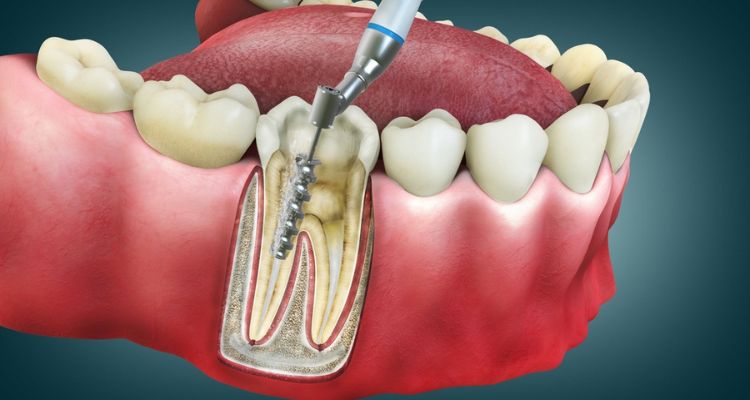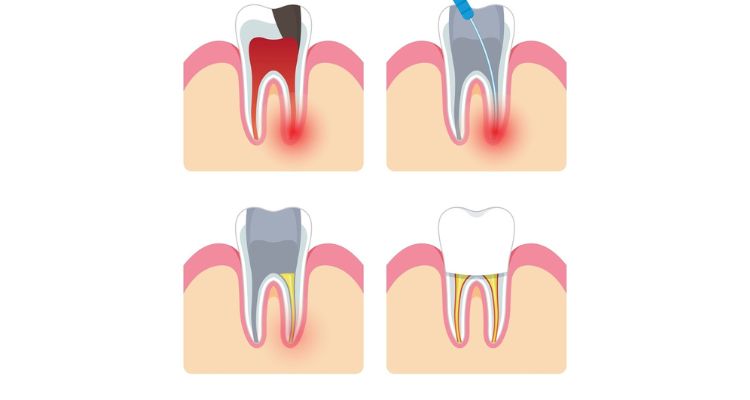In Which Cases is Root Canal Treatment Performed?
Root canal treatment is performed in several cases where the inner pulp of a tooth becomes infected or damaged. Here are the key situations where root canal treatment is necessary:
- Severe Tooth Decay: When a cavity extends deep into the tooth and reaches the pulp, causing infection or inflammation.
- Cracked or Chipped Teeth: A crack or chip in the tooth can expose the pulp to bacteria, leading to infection that requires root canal treatment.
- Repeated Dental Procedures: Multiple dental procedures on the same tooth can irritate the pulp, eventually necessitating a root canal.
- Trauma or Injury: A traumatic injury, such as a blow to the mouth, can damage the pulp even if there is no visible crack or chip, leading to the need for treatment.
- Deep Infections: An untreated dental infection can spread to the pulp, causing severe pain and swelling that requires a root canal to save the tooth.
- Abscess Formation: When an infection leads to an abscess at the root of the tooth, causing significant pain and swelling, root canal treatment is often needed to resolve the issue.
Root canal treatment is crucial in these cases to save the affected tooth, relieve pain, and prevent the spread of infection.

How is Root Canal Treatment Done in Turkey?
Root canal treatment in Turkey is a meticulous procedure designed to save a tooth that has been severely damaged or infected. The process begins with an initial examination, where the dentist assesses the extent of the damage using X-rays to determine if root canal treatment is necessary. Once confirmed, the treatment starts with the administration of local anesthesia to ensure the patient is comfortable and pain-free during the procedure.
The dentist then creates a small opening in the crown of the tooth to access the infected or inflamed pulp. Using specialized instruments, the dentist carefully removes the damaged pulp from the root canals, thoroughly cleaning and disinfecting the inside of the tooth to eliminate any bacteria or debris. After the canals are cleaned, they are shaped and filled with a biocompatible material called gutta-percha, which seals the canals to prevent further infection.
Finally, the tooth is sealed with a temporary filling, and in most cases, a crown is placed on the tooth in a subsequent visit to restore its strength and appearance. This treatment not only relieves pain but also preserves the natural tooth, allowing the patient to maintain normal chewing and biting function. The entire process is performed with precision and care, utilizing advanced technology available in Turkish dental clinics to ensure a successful outcome.
What are the Risks of Root Canal Treatment?
Root canal treatment is generally a safe and effective procedure, but like any dental treatment, it carries some risks. Here are the potential risks associated with root canal treatment:
- Infection: Although the procedure is designed to eliminate infection, there’s a small risk that bacteria may persist or re-enter the tooth, leading to a recurring infection.
- Tooth Fracture: After root canal treatment, the tooth may become more brittle, increasing the risk of fractures, especially if a crown is not placed to protect it.
- Incomplete Cleaning: In rare cases, the complex anatomy of the tooth may make it difficult to fully clean and seal all of the root canals, which could result in persistent or recurring issues.
- Instrument Breakage: There’s a slight risk that the small instruments used to clean the canals might break inside the tooth, which can complicate the procedure.
- Post-Treatment Discomfort: Some patients may experience temporary discomfort, swelling, or sensitivity following the procedure, which usually subsides with time and proper care.
- Allergic Reactions: Although rare, some patients may have an allergic reaction to the materials used during the procedure.

What are The Benefits of a Root Canal Treatment?
Root canal treatment offers several important benefits for patients dealing with severe tooth decay or infection.
- Root canal treatment effectively eliminates the source of pain caused by an infected or inflamed tooth pulp, providing immediate relief.
- The procedure allows the natural tooth to be preserved, preventing the need for extraction and maintaining the tooth’s function and appearance.
- By removing the infected tissue and sealing the tooth, root canal treatment prevents the spread of infection to surrounding teeth and gums.
- A restored tooth after root canal treatment functions like a natural tooth, allowing patients to chew and bite normally.
- Protects Surrounding Teeth: Preserving the natural tooth helps maintain the alignment and stability of adjacent teeth, preventing potential bite problems.
- After a root canal, the tooth is often restored with a crown or filling, which can enhance the appearance of the tooth and improve the overall smile.
- With proper care, a tooth that has undergone root canal treatment can last a lifetime, providing a durable and reliable solution to severe dental issues.
How Much Does Root Canal Treatment Cost in Turkey?
The cost of root canal treatment in Turkey is generally more affordable compared to many other countries, making it an attractive option for both local and international patients. The exact cost can vary depending on factors such as the complexity of the case, the specific tooth being treated (molars are typically more expensive due to their complexity), and the location and reputation of the dental clinic. Despite the lower costs, Turkish dental clinics are known for their high standards of care, advanced technology, and experienced professionals.
Get a Free Quote
Frequently Asked Questions
Turkey offers high-quality dental care at significantly lower costs compared to many Western countries. The combination of advanced technology and experienced dentists ensures effective and safe treatment.
Root canal treatment typically requires one to two visits, depending on the complexity of the case. Most procedures are completed within an hour, with a follow-up visit if a crown is needed.
No, the procedure is performed under local anesthesia, so you should not feel pain during the treatment. Some discomfort may occur afterward, but it is usually manageable with over-the-counter pain relievers.
After the root canal, your dentist may recommend placing a crown to protect the treated tooth. This usually requires an additional visit and is a common practice to ensure the tooth's durability.
The cost of root canal treatment in Turkey is more affordable than in many other countries, though it varies depending on the tooth being treated and the complexity of the case. Despite the lower costs, patients receive high-quality care from experienced professionals.

